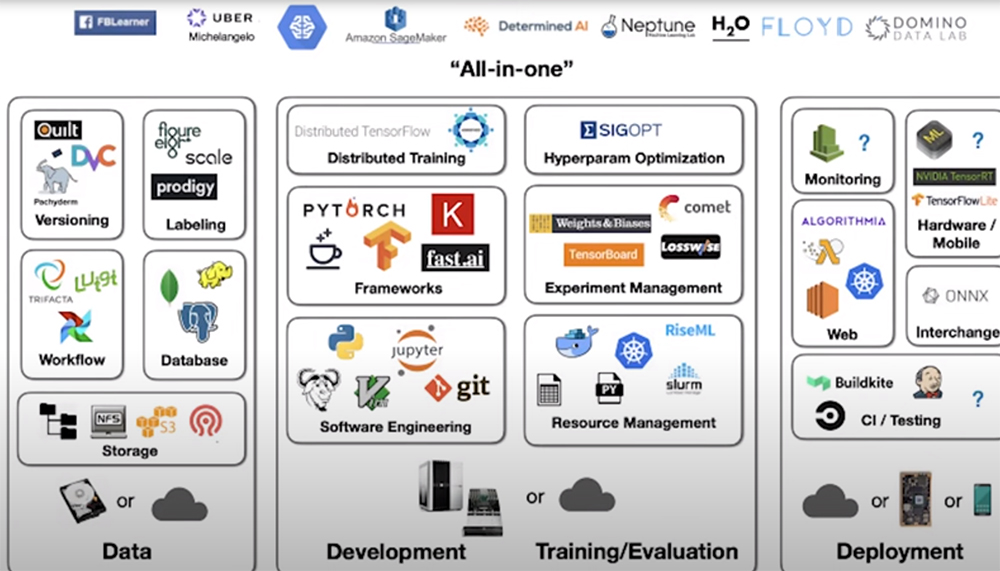Machine Learning Engineer and Software Engineer are two distinct roles within the realm of technology, each with its unique skill set and responsibilities. In the rapidly evolving landscape of artificial intelligence and software development, understanding the differences between these roles is crucial for aspiring professionals and organizations alike.
This article delves into the contrasting aspects of Machine Learning Engineers and Software Engineers, exploring their core competencies, daily tasks, and the essential roles they play in developing cutting-edge technologies.
By shedding light on these disparities, readers can gain valuable insights into the specialized areas of expertise required for success in either of these dynamic fields, ultimately aiding them in making informed career choices or recruiting decisions.
What Is Machine Learning?

There are several types of machine learning:
- Supervised Learning: The model is trained on a labeled dataset, meaning the correct answer (label) is provided for each example in the training data. The goal is to predict the label for new, unseen data;
- Unsupervised Learning: The model is given unlabeled data and must find patterns and relationships within the data. Common tasks include clustering (grouping similar examples) and dimensionality reduction (simplifying complex data structures);
- Reinforcement Learning: The model learns by interacting with its environment, receiving rewards for correct actions and penalties for incorrect ones;
Machine learning is used in a wide range of applications, including recommendation systems (like those used by Netflix and Amazon), image and speech recognition, medical diagnosis, credit scoring, and self-driving cars.
What Is a Software Engineer:
Role:
Software engineers are the architects behind the digital tools and applications we use every day. Their primary role is to design, develop, test, and maintain software systems. They transform ideas and concepts into functional, user-friendly software applications, enabling businesses and individuals to operate efficiently and effectively.
Software engineers work at the intersection of technology and creativity, translating user requirements into practical code [2].
Responsibilities:
- Software Development: Developing high-quality software is the core responsibility of a software engineer. They write, test, and maintain code that powers everything from mobile apps to operating systems and web platforms;
- System Design: Software engineers are tasked with creating a blueprint for software systems. They determine the architecture and structure, ensuring that the software meets the requirements while being scalable and maintainable;
- Testing and Debugging: Thoroughly testing and debugging software is crucial to ensure it functions correctly. Software engineers identify and fix issues and bugs to deliver reliable products;
- Collaboration: Collaboration is a key aspect of a software engineer’s job. They work closely with other team members, including designers, product managers, and quality assurance testers, to bring a project from conception to completion;

- Documentation: Software engineers create documentation that helps others understand the code and the software system’s functionality. This documentation is vital for maintaining and improving the software over time;
- Continuous Learning: Technology evolves rapidly, and software engineers need to stay up-to-date with the latest tools, programming languages, and best practices. Continuous learning is an inherent part of their role;
Education:
A bachelor’s degree in computer science, software engineering, or a related field is typically the minimum educational requirement for becoming a software engineer. However, many professionals pursue higher education, such as master’s degrees or certifications, to enhance their expertise. The educational path often includes coursework in programming languages, data structures, algorithms, software design, and project management.
Additionally, software engineers benefit from hands-on experience, either through internships or personal projects. Practical experience allows them to apply theoretical knowledge in real-world situations and gain a deeper understanding of the software development process.
What Is a Machine Learning Engineer:
Role:
Machine Learning Engineers play a pivotal role in the development of AI systems and machine learning algorithms. Their primary focus is to build and deploy models that can learn from data and make predictions or decisions based on that data. These models are used in various applications, from self-driving cars to recommendation systems [3].
Responsibilities:
- Data Collection and Preparation: Machine Learning Engineers are responsible for collecting, cleaning, and preparing data for training machine learning models. High-quality data is essential for accurate predictions;
- Algorithm Development: They design and implement machine learning algorithms, selecting the most appropriate models for the task at hand. This involves choosing from a wide array of techniques such as neural networks, decision trees, and support vector machines;
- Model Training: Machine Learning Engineers train models using labeled data, adjusting parameters to optimize model performance. This process requires a deep understanding of the chosen algorithm and the data being used;
- Testing and Evaluation: Models need to be rigorously tested and evaluated to ensure their accuracy and reliability. Machine Learning Engineers use techniques like cross-validation and metrics such as accuracy and F1-score to assess model performance;
- Deployment: After a model is trained and validated, it needs to be deployed in real-world applications. Machine Learning Engineers ensure that models are integrated seamlessly into the software systems where they will be used;
- Maintenance and Monitoring: Once deployed, machine learning models require ongoing maintenance and monitoring. Engineers are responsible for detecting and addressing issues that may arise, such as concept drift or data bias;

- Research and Development: Staying abreast of the latest developments in machine learning is crucial. Machine Learning Engineers often engage in research and development to improve existing models or develop new ones;
Education:
Machine Learning Engineers typically hold a bachelor’s or master’s degree in computer science, data science, or a related field. However, the education required for this role is more specialized, with a strong emphasis on machine learning, data analysis, and statistics. Courses often cover topics like deep learning, natural language processing, and reinforcement learning.
In addition to formal education, machine learning engineers often benefit from specialized training in popular machine learning frameworks and tools such as TensorFlow or PyTorch. Practical experience is crucial, and many aspiring machine learning engineers engage in personal projects, internships, or research to gain hands-on experience in the field.
Differences Between Machine Learning Engineers And Software Engineers:
Developer Perspective:
- Software Engineers: Focus on building software applications and systems to meet specific user needs, with an emphasis on creating functional, user-friendly software;
- Machine Learning Engineers: Concentrate on developing machine learning models and algorithms that can learn from data to make predictions or decisions, enabling autonomous decision-making;
Product Perspective:
- Software Engineers: Primarily create software products and tools that serve end-users, such as mobile apps, websites, or operating systems;
- Machine Learning Engineers: Often work on AI-driven products or features, including recommendation systems, image recognition, and natural language processing;
Demand:
- Software Engineers: The demand for software engineers remains consistently high across various industries, reflecting the ubiquitous need for software solutions;
- Machine Learning Engineers: With the increasing integration of AI, there is a growing demand for machine learning engineers, especially in sectors like healthcare, finance, and e-commerce;
Work Environment:
- Software Engineers: Tend to work on well-defined projects and follow established software development methodologies;
- Machine Learning Engineers: May engage in more research-oriented work, experimenting with various algorithms and data sets to improve model accuracy;
Communication Style:
- Software Engineers: Interact closely with cross-functional teams, including designers, product managers, and quality assurance testers, to deliver a complete software product;
- Machine Learning Engineers: Collaborate with data scientists and domain experts to collect and preprocess data, aligning machine learning models with specific industry requirements;
Skills:
- Software Engineers: Proficient in programming languages, software architecture, and application design. Skills encompass front-end and back-end development;
- Machine Learning Engineers: Possess expertise in machine learning algorithms, data analysis, and domain-specific knowledge. Skills may include Python, TensorFlow, PyTorch, and data preprocessing techniques [4];
Prospects:
- Software Engineers: Benefit from a stable and diverse job market, with opportunities to work on a wide range of software projects. Potential for roles in development, quality assurance, or project management;
- Machine Learning Engineers: Experience significant growth potential as AI and machine learning continue to evolve. Career prospects include roles in research, data science, and AI development, with opportunities for specialization in areas like computer vision, natural language processing, and reinforcement learning;

Tools and Languages
Approach to Problem-Solving
Software Engineers often follow a deterministic approach to problem-solving, where a given input will always produce the same output5. In contrast, Machine Learning Engineers deal with probabilistic models, where the output may vary even with the same input.
Education and Skills
While both roles require a strong foundation in computer science and programming, Machine Learning Engineers often need additional knowledge in statistics, linear algebra, and calculus. They also need experience with machine learning algorithms and deep learning frameworks.
Proof of Concept
Writing a script in software engineering can be similar to a proof-of-concept notebook in machine learning. However, ML engineers additionally deal with code, models, and data.
Is Machine Learning Difficult:
Machine Learning, a subset of artificial intelligence, is a complex and rapidly evolving field that has garnered a reputation for its challenges.
Several factors contribute to its perceived difficulty:
Software Engineers Need a Different Mindset:
- Mathematical Foundation: Machine Learning relies heavily on mathematical concepts such as linear algebra, calculus, and probability. A strong grasp of these principles is crucial for understanding and developing machine learning algorithms;
- Data-Centric Approach: Machine Learning engineers work with large datasets, requiring skills in data preprocessing, cleaning, and feature engineering. This data-centric mindset differs significantly from traditional software engineering;
- Experimentation and Iteration: Machine Learning often involves a trial-and-error approach. Engineers must experiment with various algorithms, hyperparameters, and model architectures to achieve the desired results. This iterative nature can be challenging;
- Domain Knowledge: Many machine learning applications require a deep understanding of the specific problem domain, making interdisciplinary knowledge essential. For example, medical image analysis necessitates familiarity with both healthcare and machine learning;
- Evolving Landscape: The field evolves rapidly, with new algorithms, tools, and best practices constantly emerging. Keeping up with these changes demands a commitment to continuous learning;

The Engineering Roles Are Often Different:
- Development Goals: Software engineers focus on creating functional software products, emphasizing usability, user experience, and practicality. In contrast, machine learning engineers concentrate on building models that can learn and make predictions, which may not always align with traditional user-centric goals;
- Problem Complexity: Machine learning often deals with problems that are intrinsically complex, like natural language processing, computer vision, or reinforcement learning. These complexities can make developing and fine-tuning machine-learning models challenging;
- Validation and Evaluation: Unlike software engineering, where the correctness of the code can be rigorously tested, machine learning models require validation and evaluation using metrics that might be unfamiliar to traditional software engineers;
- Interdisciplinary Skills: Machine learning engineers often need to collaborate closely with domain experts, data scientists, and statisticians, which demands a blend of technical and communication skills not typically emphasized in traditional software engineering [5];
What Career To Choose – Machine Learning Engineer vs. Software Engineer?
Choosing between a career as a Machine Learning Engineer and a Software Engineer is a significant decision that depends on your interests, skills, and long-term career goals.
Here are some factors to consider when making your choice:
Machine Learning Engineer:
- Interest in AI and Data Science: If you are passionate about artificial intelligence, data analysis, and working on cutting-edge technologies like self-driving cars, recommendation systems, and natural language processing, a career as a Machine Learning Engineer may be the right choice;
- Mathematical Aptitude: Machine Learning Engineers need a strong foundation in mathematics, including linear algebra, calculus, and statistics. If you enjoy working with mathematical concepts and applying them to real-world problems, this role may be appealing;
- Desire to Solve Complex Problems: Machine Learning often involves solving complex, data-driven problems. If you enjoy tackling intricate challenges and optimizing algorithms, this field can be intellectually stimulating;
- Continuous Learning: The field of Machine Learning evolves rapidly, so a willingness to continuously learn and adapt to new techniques and tools is essential;
Software Engineer:
- Diverse Career Opportunities: Software Engineering offers a wide range of career opportunities, from front-end and back-end development to system architecture and mobile app development. If you want versatility in your career path, this field provides numerous options;
- User-Centric Focus: Software Engineers create software products that directly impact end-users, making their work more visible and user-centric;
- Structured Development: Software engineering often follows established development methodologies and practices, making it a suitable choice for those who prefer structured, methodical approaches to problem-solving;
- Cross-Functional Collaboration: Software Engineers typically work closely with cross-functional teams, including designers, product managers, and quality assurance testers, fostering collaboration and diverse skill sets;
FAQ:
-
Do machine learning engineers make more than software engineers?
Compensation can vary significantly based on factors like experience, location, and company. Machine learning engineers often command competitive salaries due to their specialized skills in high demand, which can surpass those of software engineers with similar experience [6].
-
What does a machine learning engineer do?
Machine learning engineers design, develop, and deploy machine learning models and algorithms. They collect and preprocess data, train and fine-tune models, and integrate them into software systems. Their focus is on enabling systems to learn and make predictions based on data.
-
What does a software engineer do?
Software engineers design, develop, test, and maintain software applications and systems. They create user-friendly, functional software products, often following established software development methodologies and collaborating with cross-functional teams.
-
Can you learn machine learning on your own?
Yes, you can learn machine learning on your own. Numerous online courses, tutorials, and resources are available. However, formal education or specialized training can provide a structured learning path and may be beneficial for in-depth understanding.
-
How long will it take to learn machine learning?
-
Can a software engineer work as a machine learning engineer?
Yes, a software engineer can transition to a machine learning engineering role. However, they will need to acquire machine learning-specific knowledge and skills, such as understanding algorithms, data preprocessing, and model development.
-
Do ML engineers make more than software engineers?
As mentioned earlier, machine learning engineers often earn competitive salaries, sometimes more than traditional software engineers, due to the specialized nature of their work and the demand for machine learning expertise.
-
Is machine learning a lot of coding?
Yes, machine learning involves a significant amount of coding. Engineers write code to develop and train machine learning models, preprocess data, and integrate models into applications.
-
Is Java or C++ better for machine learning?
Python is the most commonly used language for machine learning due to its extensive libraries and community support. While Java and C++ are suitable for some machine learning tasks, Python is generally preferred for its ease of use.
-
Does ML engineer require coding?
Yes, machine learning engineers require coding skills. They use programming languages like Python, R, or even Java or C++ to develop, train, and deploy machine learning models.
-
Why are ML engineers paid so much?
Machine learning engineers are highly paid because their skills are in demand, and they work on complex projects that have a significant impact on businesses, such as developing recommendation systems, autonomous vehicles, and fraud detection models.
-
Do machine learning engineers use C++?
While Python is more common, some machine learning engineers use C++ for specific tasks, especially when performance optimization is crucial.
-
What is the best language for machine learning?
Python is widely regarded as the best language for machine learning due to its extensive libraries like TensorFlow and PyTorch, ease of use, and a large community of developers.
-
Is AI more difficult than software engineering?
AI, including machine learning and deep learning, can be more challenging than traditional software engineering due to the need for a strong mathematical foundation and a deeper understanding of complex algorithms.
-
Where do machine learning engineers make the most money?
Machine learning engineers often command higher salaries in tech hubs and metropolitan areas, such as Silicon Valley, New York City, and San Francisco, due to the high demand for their skills and the cost of living.
-
Should I learn software engineering or AI?
The choice depends on your interests and career goals. Software engineering is a broad field, while AI and machine learning offer specialized opportunities. Consider what aligns with your passion and the evolving tech landscape.
-
Is machine learning a safe job?
Machine learning is in high demand, and the field is expected to continue growing. It offers good career prospects, but like any job, it’s not entirely without risk. Staying updated with evolving technology is essential.
-
Does Google hire ML engineers?
Yes, Google and many other tech companies hire machine learning engineers to work on various AI-related projects, such as search algorithms, natural language processing, and autonomous systems.
-
Should I learn Java or Python for machine learning?
Python is the preferred language for machine learning due to its extensive libraries and ease of use. While Java can be used, Python is more widely adopted in the machine learning community.
Useful Video: Software Engineering or Machine Learning: What’s a better career?
References:
- https://sertiscorp.medium.com/machine-learning-engineer-vs-software-engineer-what-are-the-differences-a4047a8a8c2e
- https://www.interviewquery.com/p/software-engineering-vs-machine-learning
- https://medium.com/dataseries/machine-learning-engineer-or-software-engineer-whats-the-difference-7f31e0a722e2
- https://futurice.com/blog/differences-between-machine-learning-and-software-engineering
- https://datasciencenerd.com/is-machine-learning-harder-than-software-engineering/
- https://www.reddit.com/r/cscareerquestionsEU/comments/o1edun/machine_learning_vs_software_engineer_career/










Leave a Review